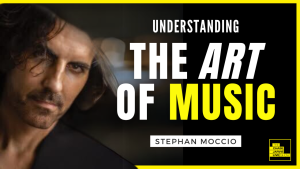Look at high-achieving individuals from Olympians to business mavericks and you’ll quickly notice one thing they all have in common – a strong mindset. As the command center for the actions we take, our brains play an undeniably critical role in the pursuit of success. It’s one thing to set goals, but another to have the mental strength to stay committed to them when things don’t go as planned. To that end, any individual, whether they’re in the creative field or any other profession, can benefit from cultivating a persistent, winner’s mindset.
Renowned psychologist Dr. Michael Gervais has spent his entire career studying the relationship between the human mind and performance. In a recent podcast, we sat down together to discuss the components of a positive, success-oriented mindset.
Is Psychology Only for the Weak?
Psychology, mental health, and other matters of the mind have long been considered taboo topics in the public eye. Most people associate them with the idea of dysfunction, as if the human brain doesn’t naturally need some degree of support in order to perform at its best. Toxic masculinity is a great example – it’s the reason why so many guys balk at the idea of going to therapy.
That’s for people with “real” problems, or who aren’t strong enough to deal with things on their own, right?
Wrong. Mental health isn’t just about dysfunction. It’s about being able to function in a healthy and balanced way no matter what life throws at you. It’s not limited to mental illness either – it’s about making sure your thoughts, feelings, and behavior align with the kind of life you want to create for yourself.
Micahel believes that the more we talk about the implications of mental health, the better positioned we’ll all be to recognize and address the factors that may negatively impact our personal well-being and success alike. He aims to reframe the narrative that so many of us are used to with a fresh perspective, saying “The way I think of psychology right now is the study of oneself. If you want to be better at anything, you need to study it, right?”
There’s no weakness involved – far from it, actually. Psychology is a tool for the strong and strategic.
Taking the First Steps Towards a Winning Mindset
The tricky thing about hacking something as complicated as the human mind is that it’s never straightforward. It’s one thing to say you want to live life with a better mindset, but there isn’t any kind of on/off switch to facilitate that. Change needs to happen on a subconscious level in order to have the right intrinsic effects.
How can I be more present? How can I be more fluid? What can I do to stop worrying about the past and future? These are complex questions that can’t be answered with a perfect formula.
The best thing we can do is start small and use mindful techniques such as meditation, affirmations, visualization, and writing down goals. All of these little steps can help us break free from negative patterns, increase our focus and clarity, promote a positive attitude toward life, and help us become more in tune with ourselves.
Belonging Is Safety, Danger Is Authenticity
Michael goes into further detail on our topic by underscoring the implications of self-perception on mindset. It seems as if comparing yourself to others is a universal experience, and likewise something that many of us practice throughout every stage of life. Why?
Our brains are hardwired for survival, yet we live in a modern world where the average person isn’t out to kill us. A reality with few real weapons to worry about has opened the door to a new kind of fear – the socially-driven kind. Criticism, judgment, condemnation, and critique are all heavy-hitting psychological ammunition that can be fired off without warning.
The mere thought of speaking in public can create an immense amount of anxiety and insecurity.
Michael advises that the best way to counter this is by remembering who you are and what your unique value is. By writing down your strengths, skills, values, and accomplishments on a regular basis (by journaling for example), you can remind yourself of the qualities that make you exceptional, and stop comparing yourself to those around you.
Something he credits as being incredibly helpful for his own development is focusing on the ‘why’ behind thoughts and actions. What matters most to you, on a subconscious level? Michael says that whittling down, identifying, and repeating a one or two-sentence personal philosophy can be a great habit when looking to become more authentic and guided in day-to-day life. It’s a matter of engraining values and sticking to them. As you practice it consistently, it will become almost second nature – or perhaps better said first nature, because that’s what authenticity is.
Michael’s advice might seem simple, but it bears repeating – being authentic requires a level of self-awareness that doesn’t come easily, and for many people, the struggle to embrace their true selves is a lifelong journey. But for those willing to look within and practice, there’s no limit to the achievement that comes from living a life of full purpose-driven action. Give ‘The First Rule of Mastery‘ a read for more advice and insight from Michael Gervais – he has plenty to share with those looking to break through and find out who they truly are.
Enjoy!
FOLLOW MICHAEL:
instagram | twitter | website





















